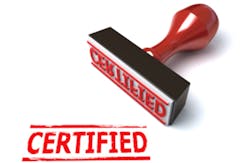Water Quality Association makes changes to certification titles
LISLE, Ill. — The Water Quality Association (WQA) has announced some important changes to its professional certification scheme in coordination with the unveiling of its new Modular Education Program (MEP), according to a press release.
Beginning in March 2015, WQA will offer two advanced-level certifications — Master Water Specialist and Master Service Technicians — and four core titles, Certified Water Treatment Representative, Certified Water Specialist, Certified Installer and Certified Service Technician, the release reported.
The Certified Water Specialist (CWS) designation will cease to exist in its current form, noted the release, and certified professionals holding the titles of CWS-V and CWS-VI will be redesignated as Master Water Specialists, while professionals holding the titles of CWS-I, CWS-II, CWS-III and CWS-IV will be redesignated simply as Certified Water Specialists.
Individuals currently holding the Certified Installer (CI) designation will retain that titled while those holding the Certified Sales Representative (CSR) title will be redesignated as Certified Water-Treatment Representative (CWRs), according to the release.
“These fundamental changes to how WQA educates and certifies professionals were made with the input of numerous volunteers and a top learning design firm,” explains Tanya Lubner, Ph.D., WQA director of education and professional certification. “We wanted to provide training options for a variety of different types of employees, regardless of whether they plan to pursue certification, while also reimagining our certification structure to mirror the precise training needs of the companies we serve. We feel our new programs will provide even more value, both to the learner and his or her employer.”
Find out more about the new education and certification guidelines at www.wqa.org.
